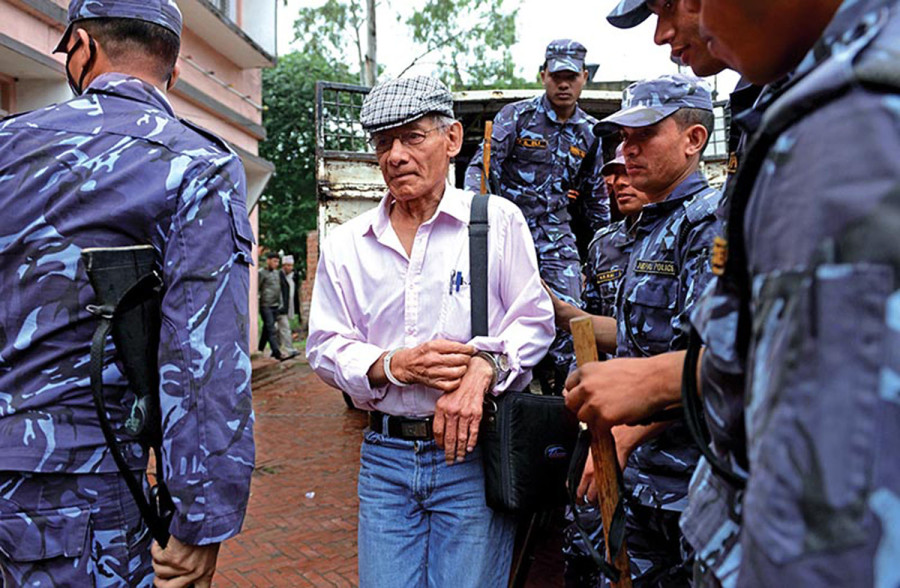Miscellaneous
Raamesh Koirala’s book about Charles Sobhraj is confused, leaving the reader unsure of whether this is a memoir or a novel
Raamesh Koirala’s new book about the notorious serial killer Charles Sobhraj is a strange animal. Although ostensibly presented as a non-fiction memoir written by the cardiac surgeon who operated on Sobhraj’s heart, the copyright page of the book asserts that “This is a work of fiction.” Perhaps this was an (glaring) oversight on the part of the publisher, but given the manner in which the book unfolds, it might be an accurate characterisation.
Pranaya SJB Rana
Raamesh Koirala’s new book about the notorious serial killer Charles Sobhraj is a strange animal. Although ostensibly presented as a non-fiction memoir written by the cardiac surgeon who operated on Sobhraj’s heart, the copyright page of the book asserts that “This is a work of fiction.” Perhaps this was an (glaring) oversight on the part of the publisher, but given the manner in which the book unfolds, it might be an accurate characterisation.
Peppered throughout the narrative of how Koirala came to operate on Sobhraj and the minute detailing of the dilemma the former faces over saving the life of a murdered are fictional, almost surreal sections where he imagines how Sobhraj might have conducted his murders. The first time Koirala ventures into this territory, it is jarring and unexpected. But I assumed that this is how the book would play out—non-fictional accounts alongside a fiction reimagining of Sobhraj’s murders. I was wrong. The fictional interludes are sporadic and later, morph into a bizarre fictional television ‘interview’ that Koirala is holding with Sobhraj. This fictional section has been reproduced in a number of newspapers as an excerpt, although I fear many readers might be labouring under the misapprehension that this is a non-fiction retelling.
It is thus difficult to take Koirala at his word. The success of a memoir lies in the fact of its happening—that this narrative, however unbelievable, actually happened to someone. So, in the wake of the James Frey episode, it is perhaps safer to characterise a ‘memoir’ such as this one as fiction. Once fiction intervenes, the entire memoir becomes suspect. Did Sobhraj really talk to Koirala that way? How does Koirala recall exactly what Sobhraj said? Did Sobhraj actually give Koirala permission to write the book? If yes, why does Koirala provide a disclaimer at the end which states, “Since Charles Sobhraj was a proven murderer in my country, I possessed the right to talk about him, write about him, and discuss his character, even without taking his consent.”
And most importantly, did Koirala actually suffer through the moral dilemma he presents, or did he dwell on it after the fact?
All consternation aside, the book makes for a fairly engaging read. The writing is clear and lucid, although hackneyed at times. The book moves at a fair clip, never staggering or stalling. It’s a straightforward narrative, telling the story as it unfolds. The historical asides and fictional interludes don’t ruin the flow of the novel, even if they don’t necessarily serve the larger purpose of the book.
That said, the book tends to navel-gaze. The good doctor does spend an inordinate amount of time dwelling on whether he should or should not operate on Sobhraj, who has asked specifically for him. Throughout the book, Koirala takes us on a journey detailing Sobhraj’s many crimes, most of which seem to have been culled from the numerous books and documentaries on the killer known as the Serpent. There is little that is new here, except for Sobhraj’s interactions with Koirala and a particularly damning indictment of the French Embassy’s indulgence of a convicted serial killer (They bring him flowers and food and are overly concerned with his well-being and good health). The narrative arc of the book is fairly simple and obvious—the doctor takes pains to first characterise Sobhraj as an evil, merciless murderer and concludes with the fact that he is delusional and narcissistic but also a frail old man, afraid of dying. This comes as no one surprise to anyone.
The narrative framing of the book, which begins and ends with a hike into the mountains, is particularly strange. A hike to Jhigrana is where Koirala first gets the call asking him to operate on Sobhraj but the later obsession with a trek to Thorong La feels forced, as if it were an attempt to close the book neatly, ending it as it began. This poetry is lost due to its forced nature.
Raamesh Koirala is well-known in Nepal, as a surgeon, a writer and a commentator, as the jacket of his book attests in an embarrassing typo: “He is known for his sharp views on current issues, primarily in public health and politics, which he writes about in op-ends of leading newspapers.” The book is thus peppered with commentary on current affairs, although there is never enough time to dwell on them. Koirala makes a point of stating domestic political happenings as if they would interest the world, but I doubt anyone outside of Nepal cares about how Ncell was evading its capital gains tax. This kind of op-ed adds a semblance of substance to a weak narrative but it remains just that, a semblance.
When I picked up this book, I was hoping for a doctoral musing the likes of those written by Oliver Sacks or Paul Kalanithi. The inordinate amount of respect that society confers on doctors is perhaps well deserved. After all, doctors do save lives. That alone provides them with access to a range of human emotions that most of us encounter only fleetingly. A sensitive doctor, attuned to the rhythms of human consciousness and being, can tell fantastic stories and in a manner that illuminates and enlightens. You only have to pick up an Oliver Sacks book to see how this plays out.
Dr Koirala is possibly a great surgeon, and he appears to be a sensitive man. But in writing about Sobhraj, I wonder if Koirala is writing more about himself. Although the subject of the book is The Serpent, it is Koirala’s dilemma over whether or not to uphold the Hippocratic Oath that drives the narrative. But that is a foregone conclusion, there is no doubt in any reader’s mind of what he did. After all, Koirala himself tweeted out a photo with his arm around Sobhraj just before they went into surgery. The dilemma here is thus not much of a dilemma at all. It makes for a good story, but one to be told quickly and succinctly.
 Charles Sobhraj: Inside the heart of the Bikini Killer
Charles Sobhraj: Inside the heart of the Bikini Killer
Author: Raamesh Koirala
Publisher: Rupa Publications
Pages: 204
Price: Rs 800




 9.83°C Kathmandu
9.83°C Kathmandu










